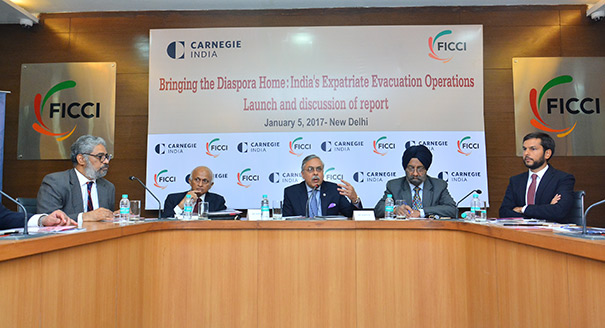Registration
You will receive an email confirming your registration.
On January 9, India celebrated Pravasi Bharatiya Divas, a day to mark the contribution of the overseas Indian community to the development of India. In advance of the commemoration, Carnegie India, in partnership with the Federation of Indian Chambers of Commerce and Industry (FICCI), hosted the launch of a new paper by Dr. Constantino Xavier entitled ‘Bringing the Diaspora Home: India’s Expatriate Evacuation Operations’.
The launch brought together over forty stakeholders, including former Indian Foreign Secretary Ambassador Ranjan Mathai, Vice Admiral (retd.) Anup Singh, and Dr. C. Raja Mohan. The discussion was chaired by Dr. A. Didar Singh, Secretary General of FICCI, who spoke about the current government’s unprecedented efforts toward protecting the diaspora and the ability of the diaspora to participate in India’s economic development.
DISCUSSION HIGHLIGHTS
- Reinventing the Wheel: Despite the fact that India has conducted over thirty evacuation operations across Africa, Asia, and Europe, there is no formal doctrine or emergency plan for such operations, panelists said. Participants said that diplomatic missions can be severely understaffed and that entire operations are run on an ad-hoc basis. They emphasized that governments have had to reinvent the wheel for each operation, so there is immense value in documenting collective memory and studying anecdotal experience in order to create policy-oriented analysis. Participants agreed that it is crucial to effectively harness past experiences in order to improve the preparation and execution of future operations.
- Lingering Challenges: Touting recent operations as tremendous successes veils underlying operational deficiencies, participants said. They pointed out that lingering challenges from past operations would only intensify as evacuation operations grew larger in scope, and came under increasing public scrutiny. Discussants agreed that there is a need to improve both intra-government and inter-governmental coordination. They emphasized that while it was crucial for the Ministry of External Affairs to assume a leading role, it must bolster the capacity of other government and military agencies through regular and sustained information exchanges.
- Building on Experience: Given that diplomats and military personnel often devise quick-fix solutions in times of crisis, participants said that the government should develop general and emergency doctrines, which would reduce communication redundancies and increase coordination to optimize existing resources. For example, the decision to use Air India or Indian Air Force flights would have to be made on a case-by-case basis, keeping in mind over-flight issues with Pakistan. However, participants urged that the specificity of cases should not preclude the government from developing general strategies, which could entail designating a civilian fleet for evacuation operations with trained staff, instead of burdening Air India with special flights that are financial and logistical nightmares. Others asserted that the capacity and financial resources to ensure the success of evacuation operations is still lacking. To address these issues, participants suggested a comparative approach to analyze other countries’ management of similar scenarios.
- Strengthen Capacity: Speakers discussed the need for forward military presence through naval assets patrolling the region. They agreed that the armed forces’ capacity to plan and deploy in tandem with civilian authorities should be strengthened, and that the diplomatic cadre should be adequately trained and equipped to operate in hostile environments. Participants referred to the evacuation procedures from Lebanon in 2006, when 1,383 Indian nationals, 47 Nepalis, 58 Sri Lankans, and 8 Lebanese were transported by the naval ship INS Mumbai to Cyprus before being airlifted to India. The successfully orchestrated operation demonstrates the importance of civil-military coordination. Participants agreed on the importance of maintaining strong relations with friendly governments, which have enabled negotiations of ceasefire windows in the past and expedited access to bases and logistics, bolstering India’s forward deployment capacity.
- Develop Communication Strategies: Participants felt that communication technologies must be developed to effectively identify, monitor, and contact citizens abroad, while taking special care to distinguish Non-Resident Indians and Indian citizens from citizens of Indian origin. Effective communication would enable real-time updates on evacuation procedures, while facilitating media coverage would also help manage perceptions of evacuation operations. Participants stressed the importance of ensuring that evacuees are not merely brought back to the country, but are safely returned to their respective home towns with the help of state governments.
- Establish A Permanent Mechanism: While some participants explored the possibility of establishing a permanent body that could facilitate joint operations across national, regional, and international levels, others expressed their reluctance to create a new entity. Some felt that the Ministry of External Affairs should have a specific security division with military and police inputs to prepare officials for crisis situations. Overall, participants agreed that rather than transforming the existing system, the government’s focus should be to optimize it.
This event summary was prepared by Arushi Kumar, a research assistant at Carnegie India.
